Great question – the answer is actually unknown. Every month, there are publications that report on new cancer-related genes, so it's an area of great knowledge growth at the moment.
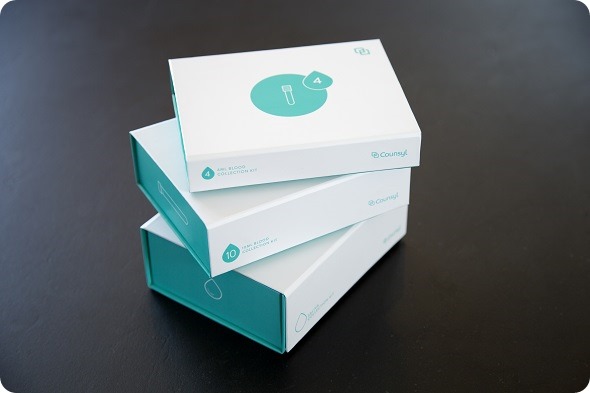
There are some populations that have a higher probability of carrying an inherited cancer risk. That doesn't mean they'll get cancer; it just means that they have genes that have increased their risk of getting cancer.
It's really based around the probability assessment of cancer risk, as opposed to baseline risk in the population. That's how these statistics are often reported, so you can understand how your personal risk is elevated.
What we’re involved in is an area of active research. Over time, independent of inherited risk, humans will almost routinely have sporadic mutations that occur on a regular basis.
That's why it's more common for adults to get cancer, since they have lived longer and accumulated sporadic mutations throughout their lifetimes. That collectively increases their risk over time, which is in addition to their inherited risk.
One focus of the research is helping people to have better immunity. Many therapeutic strategies are based on activating the immune system to try to make sure it's doing a better job of identifying and clearing mutating cells.
The cancer risk issue is an evolving answer; it's one that we'll continue to learn more about over time. In any case, we're actually trying to understand more of this because we have a large population of tested patients who came to us for reproductive testing, not necessarily because they were concerned about cancer risk.
What impact does having knowledge of an inherited mutation have for individuals? What changes can be made?
It will depend to some extent on whether or not they're in treatment. Essentially, there are two kinds of patients.
With someone who doesn't currently have a cancer diagnosis, but is concerned about their risk, is tested, and identifies that they're at an elevated risk for a particular kind of inherited cancer, the first thing that happens is that they undergo enhanced medical surveillance.
Depending on the cancer site for which they may be at higher risk, it may mean increased diagnostic testing, imaging, or other kinds of doctor follow-up, which allows things that could be arising to be picked up earlier.
There are also some cases where people will choose to pursue elective procedures to reduce their risk, including surgery, as Angelina Jolie did. That option is typically reserved for patients who do not currently have cancer.
Of course, for the patients who are receiving testing in oncology today because they already have a cancer diagnosis, it is different. The risk of getting cancer has already been resolved and unfortunately they have it.
In a subset of these cases, it's turning out to be important to understand the genetics of their cancer to determine if it was inherited or not, because that could change the surgical or treatment strategies.
For example, I was talking to a doctor last week who wanted to understand the genetic signature of these newly-diagnosed patients because they were trying to decide what type of surgery to perform.
If a patient with breast cancer has an inherited elevated risk and is scheduled for unilateral mastectomy, they may be more likely to offer the patient a bilateral mastectomy. If an enhanced ovarian risk is also implied, they may do an oophorectomy as well.
If the patient doesn't have the inherited risk, the clinician is often not going to recommend those additional procedures. That's quite actionable data in the population that has been diagnosed today.
We're also finding that in patients who have been tested by other means and have had their tumors profiled, it's also helpful in a subset of those cases to understand the background DNA signature of the patient so that you can determine whether or not the tumor you're looking at has an inherited risk component. That could change the way a physician approaches chemotherapy treatment and the way he or she recommends testing for the patient’s relatives.
It's an evolving picture. A few years ago, there wasn’t a lot of data to support the use of DNA results in the context of treatment planning for already diagnosed patients, but that's changed just in the last few years with the growth of tumor profiling.
This profiling looks at the DNA or RNA signature of the tumor cells, which is then compared to the underlying background DNA of the patient, and the two together provide more information than either one alone.
That's a relatively recent development in oncology and is likely to grow over time as our understanding of how to do informatics becomes more profound. It's a growing area of great interest.
How many different options do people currently have for genetic screening and why is Counsyl looking to expand access?
There are a number of different ways to get genetic testing in the US today. I can't speak with authority on other countries, although I know it's happening around much of the developed world.
We're offering what we believe is a differentiated service to people and actively pursuing the advancement of that offering.
Counsyl has built our testing system and service package around the OB, or obstetrics, community. The way we perform genetic counseling also turns out to be very highly valued by the practices themselves.
Our market research has shown that the oncology practices we spoke with were interested in having the same level of genetic screening and counseling service and support that we provide. So, we're bringing that level of service into the oncology market for the first time this summer as we launch into that field.
Because we’ve offered different kinds of genetic tests, we can do something that our competitors cannot. We actually have a broader understanding of the gene set from reproduction, where there's been a tremendous amount of research done. Our experience in reproductive testing gives us some advantages.
We also believe that this is an area where we all need to learn together because there's so much new knowledge emerging – so we are participants in large, public databases. There's a great one called ClinVar, which is a public database where companies can submit new information about genomic variation.
If they've learned about a new gene or how to characterize a new gene and understand its risk, for example, that information gets submitted into this public database, which all companies and academic institutions can use as a shared reference. It's a way for us to all learn together.
Counsyl is an active contributor to the ClinVar database in the US. That means a lot to some of our doctors and patients because they want to know that, while we're not using their data in a way that violates their privacy, we are collating our learnings in an unidentified way, sharing our genetic information back into this database, which allows others to benefit from that information as well.
There are quite a few people in the oncology community who have told us they would prefer to work with a laboratory that's participating in these shared databases. Otherwise they feel like they're making corporations more powerful, without helping advance the science and medicine beyond that aim.
We're also trying to make sure that we're offering what we believe are the right genes. There are a lot of genes that are known to be associated with various kinds of inherited cancer, but only a subset of them have risen to a level of confidence around that association with cancer and linked actionability such as the surveillance or surgical factors I mentioned, which allows them to be reported at our level. You've got to draw the line somewhere.
There is an organization in the US called the National Comprehensive Cancer Network (NCCN), which draws that line. The major academic cancer centers in America joined together 20 years ago and developed a set of guidelines for care in cancer that they all subscribe to and that are updated on a routine basis, at least once a year.
The NCCN has recommended genes that they believe are currently the most important to be reported in these cases and the related actions that can be taken from the knowledge that these genes are being affected.
We base our panel on what we know the NCCN has decided is appropriate and clinically actionable. That means we're providing a panel that, while comprehensive with up to 36 cancer-related genes, we’re not reporting on hundreds of genes, most of which are entirely experimental, investigational or mysterious.
In our view, reporting on those genes could lead to unnecessary downstream anxiety, costs for the patients to sort everything out and also a lot of confusion between the doctor and the patient who are trying to understand the information.
It’s important to realize that, for the most part, all these genetic tools are being offered to community and healthcare professionals who were never formally trained in genetics during their medical school training because the field advanced so quickly and recently.
We have to be mindful of the fact that our healthcare professionals are also learning along with us and need concrete information. Not getting into the investigational, hypothetical research is something they appreciate.
Many doctors are still working to integrate genetic data and knowledge from the genes we've already identified into their practices – we cannot confuse the picture with a lot of experimental noise.
As the NCCN upgrades their recommendations and inevitably increases the number to what could in a few years hundreds of genes, we're going to stick with the NCCN and continue to upgrade along with them so that we're always offering the cancer genes that we know have been identified and recommended at that level.
That also means we're able to provide a genetic testing service that's recognized by the health plans in the US. Health plans really only want to pay for genetic testing that has clinical utility.
This approach also takes a big load off the doctors because they know this is a covered service; they don't have to worry about whether or not the patients will have coverage for our tests. By tying that all together and having the right panel and the right genes for the right patients at the right time, then upgrading that over time, we think we're giving doctors what they really want.
We're also offering some sub-panels because we can customize how we do this. Say some people only want 17 genes related to gastrointestinal cancer or 8 genes related to something else – we actually have the ability to be very customized in terms of what we provide.
What are the main challenges in increasing access and how does Counsyl plan to overcome these?
I think education, access to genetic counseling and economics are the three main challenges that we face in the journey to make genetic screening more widely available and rapidly adopted.
Education is essentially the first obstacle in the field of medicine. Genetics is still an area where many doctors and their staffs have a steep learning curve. Over time, as they become more knowledgeable, access will improve for men and women who can benefit from screening.
Another obstacle is access to good genetic counseling. Counsyl offers on-demand genetic counseling. As far as I know, we’re unique in that regard. When we test patients, they’re able to get on-demand genetic counseling on the same day they receive results, and often within the same hour – a big differentiator in how we approach our service.
Access to testing is maybe only half the battle, because if a patient comes up with a positive result, it’s critical that they understand its meaning and what options are available as they consider the next step.
Many healthcare professionals may not feel comfortable having that discussion. By virtue of having trained genetic counselors that are experts, who can walk patients through the report and answer all their questions, we provide a real back up to the healthcare team.
Interestingly, a fair number of our calls are also from healthcare professionals themselves who are preparing to talk to patients and want to ensure they say the right thing.
Access to high-level, on-demand genetic counseling is something we know is rare and not routinely available with other groups. In large healthcare systems, it can take weeks or months to get an appointment with a genetic counselor because there aren't enough in the US today.
It will become even more of a problem over time as more genetic testing is conducted, because the number of counselors is not growing fast enough to keep up.
The other obstacle is economics. The cost of genetic testing has reduced quite a lot over the last decade. The kind of testing we're doing today was exorbitantly costly a decade ago, but now the technology and its cost-effectiveness have greatly improved.
We've done everything we can to make sure to drive down our cost and to provide screening in an affordable manner. That's the other reason we’ve worked to have our tests covered as an in-network, insured service, so the patients can rely on their health plans to cover costs.
Can you please give an overview of Counsyl’s pilot FirstCare?
FirstCare is a software tool that helps identify patients who have personal or family histories of cancer that suggest they are at increased risk for an inherited form of cancer and thus, would be good candidates for genetic testing.
One of the things doctors tell us is that they don't actually know how many of their patients qualify based on eligibility criteria for testing.
With FirstCare, we have the ability to generate patient invitations that come from the doctors themselves, asking the patient to complete a family history document that would confirm their eligibility and allow the doctor to have family history and genetics on the case. They don’t really have to do anything except tell us to go ahead and let FirstCare identify their cases.
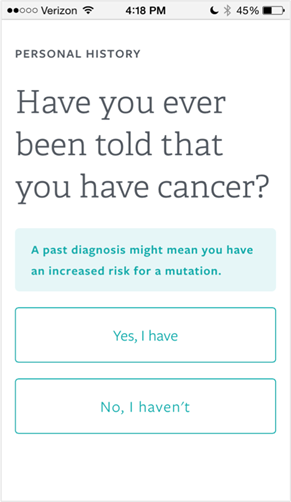
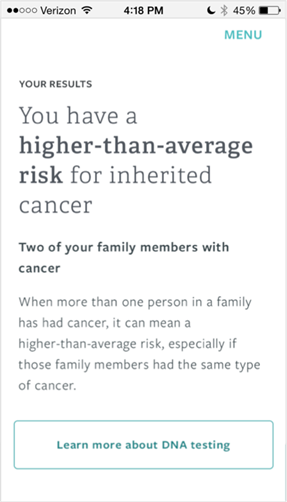
One of the things that we're finding is that because genetics is new and not something most practices were designed around, the more you can build a turn-key solution that limits the additional labor required inside a practice, the more likely it is to be adopted and used.
We've done everything we can with FirstCare to tackle this problem of figuring out who is eligible and therefore getting them in for testing by virtue of using this software agent. Over time, one of the quality metrics that'll be used to grade practices in America will be how many of your patients who were eligible for testing have been offered testing.
I think that it's important to point out that there also needs to be an evolution in eligibility criteria. The eligibility criteria that dictates who qualifies for testing today is pretty narrow. We did a fairly large study last fall in the Bay Area where we brought in people for testing at no cost, just to see what we would find.
Forty-six percent of the women that we found who had genes that elevated their cancer risk, didn't meet the criteria that would have qualified them for testing – a pretty staggering discrepancy that clearly indicates the need for updating those standards.
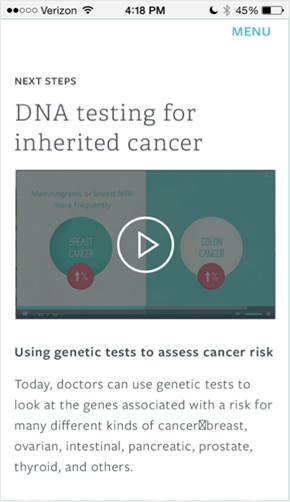
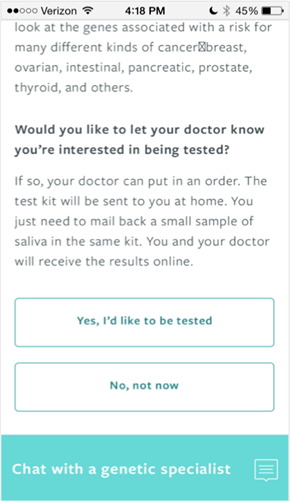
Are people offered counseling prior to genetic testing to discuss concerns?
Once patients are determined by a clinician to be eligible for testing, they're able to speak with a genetic counselor who can answer any questions they may have about their testing results.
Over time, the field may see more automated pre-test education and counseling systems emerge because it's a simple, relatively consistent discussion. However, it may be a development that’s born out of necessity because there are not enough genetic counselors to fill the demand pre-test.
In the near term, the other thing that will happen is that doctors will get their own certifications in genomics, build confidence in relaying results, and pursue continuing education to the point that they may feel they can offer counseling on their own, without referring to a third party.
What is Counsyl’s vision for the future with regards to cancer risk screening?
We believe that, over time, the penetration of genetic testing will continue to grow. You can imagine a time in the not too distant future when everyone is offered basic genetic testing to assess their risk of inherited rare diseases, of which cancer would be one of the most prominent. Eventually, our hope is that screening becomes a routine aspect of preventive care.
The upside is significant, especially as you start to collect population-level data that helps you understand health trends on a macro scale. As costs come down and the understanding of the genetic information improves, this impact is inevitable.
We are prepared to grow with the market and help expand the application of genetic data in the healthcare setting, especially within the context of preventive health and treatment. It's just early days, but there’s evidence to demonstrate that some portion of cancer patients who are undergoing genetic profiling of their tumors, will also benefit from germline testing.
As the science matures and we learn more about how a person’s genetic background plays out in terms of an ongoing cancer diagnosis, we’ll be able to develop better treatment and prevention options.
You're going to see that cancer's not the only place where that will happen. Other chronic diseases will also look to this. We're therefore part of a larger wave that will increase the penetration of genetic testing across the whole population over time, and we see that as inevitable. It's just a matter of time, technology and government policy.
As the utility of the information grows, the cost goes down, the understanding grows and therefore the mystery recedes. This is going to become ubiquitous.
In the long run, patients who are identified in large numbers who may be at risk of a particular type of cancer will go on more effective surveillance regimens. As research in this space expands, preventive therapies and other treatments are bound to emerge.
What impact do you think increased access to genetic screening will have on cancer survival rates going forwards?
I think that will play out in a couple of ways. One is that, as individuals get actionable data early, they can do what's necessary to seriously reduce risk.
Not all of these risk-reducing practices are surgical; some will be pharmacological or lifestyle-based changes, but they will reduce the incidence of cancer overall or allow it to be detected and treated at earlier stages.
In addition, for patients who are already diagnosed, the ability to receive customized therapy will depend more and more on an understanding of the genetic basis of their tumor.
I don't want to underestimate the amount of effort it's going to take, but it’s incredible that we are finally beginning to understand patients and their biology on an individual level, and allowing that to inform their own care.
It’s a concept that people have wanted to pursue for a long time, but they didn't have the technology to understand how patient A differed from patient B. That’s our ultimate goal, and we hope to see measurable increases in long-term survival across all cancers in the long run, based on a better understanding of genetics.
Where can readers find more information?
We have a lot of information and great resources available on our website: https://www.counsyl.com/. We also make our published data available at: http://research.counsyl.com/
About Ted Snelgrove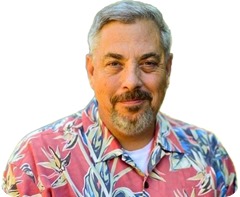
Mr. Ted Snelgrove has been Chief Business Officer at Counsyl, Inc. since January 2016. Mr. Snelgrove is responsible for driving product management and commercial strategies for Counsyl. Mr. Snelgrove previously served as Chief Executive Officer of Cellscape Corporation since July 15, 2013.
He also served as Head of Oncology/Hematology Business Unit at Jazz Pharmaceuticals, where he led a fast growing division focused on hematologic malignancies and stem cell transplant. Mr. Snelgrove has nearly 20 years of experience launching complex products in the healthcare field. He has 25 years of commercial, product management and team leadership experience.
Mr. Snelgrove has deep experience in the molecular diagnostic sector, having built and led the original commercial team at Genomic Health that created and launched the Oncotype DX product line.